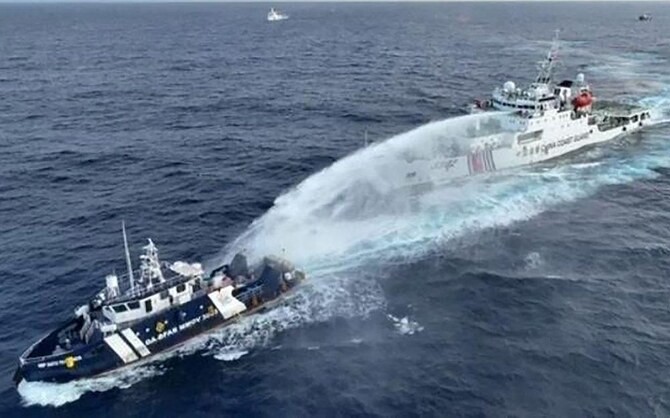
In a show of maritime cooperation, forces from the United States, Japan, and the Philippines conducted a joint patrol in the South China Sea on Friday, following recent confrontations between Chinese and Philippine vessels.
The patrol included a US P-8A Poseidon reconnaissance aircraft, Japan's Murasame-class destroyer JS Samidare, and the Philippine vessel BRP Andres Bonifacio. According to Philippine security officials, the operation took place approximately 40 nautical miles from the disputed Scarborough Shoal.
This joint exercise comes just two days after an incident where Chinese coast guard vessels reportedly fired water cannons and blocked Philippine boats attempting to deliver supplies to Filipino fishermen near Scarborough Shoal. The Philippine Department of Foreign Affairs has formally protested these actions, while China claims the Philippine vessels had encroached on its territory.
The US Indo-Pacific Command stated that the patrol aimed to protect freedom of navigation and lawful uses of international waters. The exercise included communications checks and strategic coordination between the allied forces.
Japan, which faces its own territorial disputes with China in the East China Sea, has pledged 1.6 billion yen ($10.6 million) in security assistance to enhance the Philippine navy's surveillance capabilities. This includes providing coastal radars and other defense equipment.
The United States has reaffirmed its commitment to defend the Philippines, its treaty ally, in case of attacks in the South China Sea. This latest patrol represents ongoing efforts by allied nations to counter China's increasingly assertive presence in the disputed waters, which Beijing claims almost entirely.
The Allied forces emphasized that these operations were conducted in accordance with international law and with respect for maritime safety and other states' rights. While the patrol had been delayed by typhoons, officials clarified it was not a direct response to Wednesday's confrontation at Scarborough Shoal.
Note: Only one link was added as it was the only one contextually relevant to the article content. The other provided links were about different topics (China-Russia military flights and North Korean food bans) that did not directly relate to the article's subject matter.